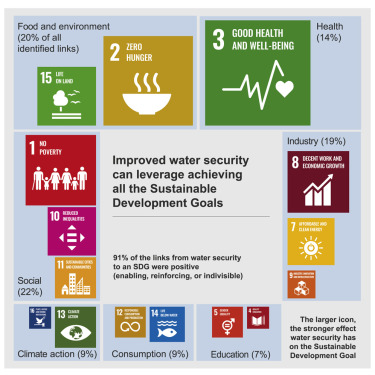COVID-19, Obesity, and Structural Racism.
A framework for understanding water's many functions for supporting, regulating, and stabilizing hydro-climatic, hydro-ecological, and hydro-social systems.
This article examines how improved water security affects the success of other SDGs, when all the goals are examined simultaneously.
This Lancet Global Health Commission advances addresses SDG 3 directly, and SDGs 1, 2, 4, 5, 8 and 10 indirectly, by comprehensively demonstrating how improving eye health by treating and preventing vision impairment and vision loss can not only advance SDG 3—improving health and wellbeing for all—but also contribute to poverty reduction, zero hunger, quality education, gender equality, and decent work and economic growth. The findings of this report frame eye health as a development issue and highlight that, with a growing ageing population globally, urgent and concerted action is needed to meet unmet eye health needs globally, including incorporating equitable eye care into countries’ universal health coverage plans.
Background: In 2016, of the estimated 257 million people living with chronic hepatitis B virus (HBV) infection worldwide, only a small proportion was diagnosed and treated. The insufficiency of information on the proportion of people infected with HBV who are eligible for treatment limits the interpretation of global treatment coverage. We aimed to estimate the proportion of people with chronic HBV infection who were eligible for antiviral treatment worldwide, based on the WHO 2015 guidelines.
HBV evolution and genetic variability: Impact on prevention, treatment and development of antivirals
Hepatitis B virus (HBV) poses a major global health burden with 260 million people being chronically infected and 890,000 dying annually from complications in the course of the infection. HBV is a small enveloped virus with a reverse-transcribed DNA genome that infects hepatocytes and can cause acute and chronic infections of the liver. HBV is endemic in humans and apes representing the prototype member of the viral family Hepadnaviridae and can be divided into 10 genotypes.
A Research Paper on obesity, in the context of SDGs 3, 9, and 11, focusing specifically on the role of multi-level and multi-component interventions addressing healthy nutrition, physical activity, and education to mitigate the rising epidemic.
An Article in support of SDG 3, showing that the age-adjusted prevalence of blindness has reduced over the past three decades, yet due to population growth, progress is not keeping pace with needs and vision impairment remains an urgent and increasingly important public health priority.
Elsevier,
Sustainable Materials for Oil and Gas Applications, Volume 1 in Advanced Materials and Sensors for the Oil and Gas Industry, 2021, Pages 125-174
This book chapter addresses SDG 7 and 9 by explaining how nanotechnology can play a role in allievating environmental impact within enhancing oil recovery.
Elsevier,
Sustainable Materials for Transitional and Alternative Energy, Volume 2 in Advanced Materials and Sensors for the Oil and Gas Industry, 2021, Pages 1-51
This book chapter addresses SDG 7 and 9 by explaining state of the art technology that is improving environmental impact in oil and gas operations including nanotechnology and supramolecular assembly solutions.

